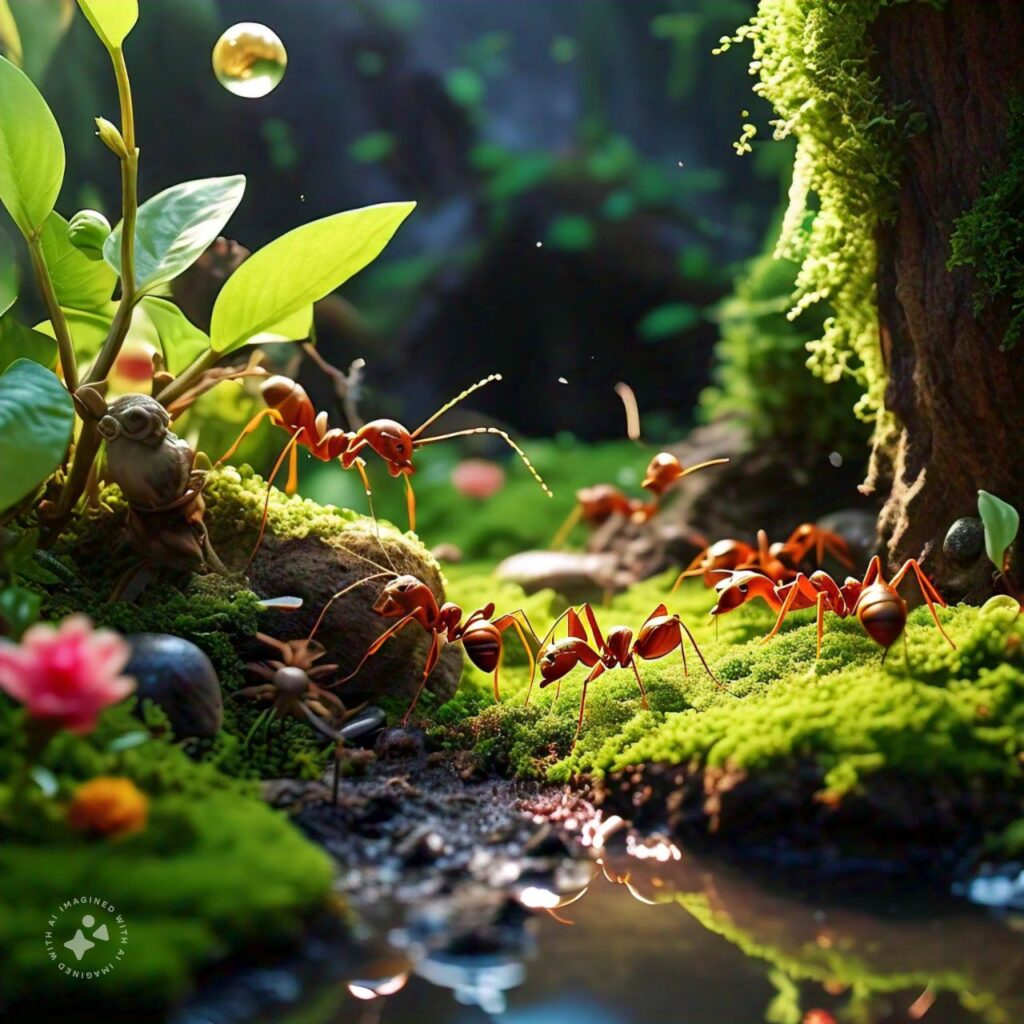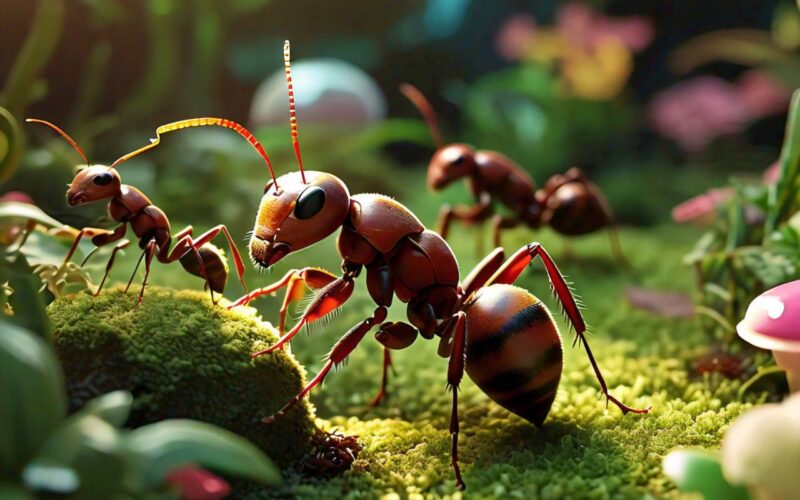Are you tired of dealing with pesky ants in your garden? You’re not alone. Many gardeners face the challenge of how to get rid of ants in your garden without causing harm to plants. Ants can damage plants and create unsightly nest sites.
The good news is you don’t have to use harsh chemical sprays. By understanding the different ant species and using natural repellents, you can keep your garden healthy and ant-free. Finding effective yet eco-friendly solutions is a top priority.
In this article, we’ll explore natural and safe methods to eliminate ants from your garden without harming your plants.

Identifying Ant Species in Your Garden
To manage garden ants, start by identifying the specific ant species. Different types of ants have unique traits and weaknesses. Understanding the common garden species and their characteristics helps you choose the most effective removal method.
Common Garden Ant Species
Some common garden ants include:
- Pavement ants: These ants have a two-node body and fine lines on their head and thorax.
- Carpenter ants: These ants live in wood, like homes, and are bigger than other garden ants.
- Black/garden ants: Also known as field ants, they build mounds in lawns and can be huge.
- Red wood ants: These ants are reddish-brown and live in wooded areas. They can get aggressive if bothered.
- Black wood ants: Like red wood ants, they are dark and build nests in decaying wood or under rocks and logs. These worker ants can cause significant damage to such materials.
It’s key to know the ant species in your garden. This knowledge helps you choose the best way to get rid of them.
Importance of Accurate Identification
Knowing the ant type is crucial for several reasons. Different ants have different behaviors and weaknesses. This means you need different control methods for each type.
For instance, some ants like protein baits, while others prefer sugar baits. Identifying the ants lets you pick the right bait or method. This way, you can control them without harming your plants and effectively manage ants in the garden without using harsh chemicals.
How do I get rid of ants in Garden without killing plants
Killing ants without harming your plants is a delicate task. You can use eco-friendly methods to do this. It’s important to avoid harsh chemicals that can hurt or kill your plants. Instead, use natural ways and methods that focus on getting rid of ants without harming your garden.
One way to keep ants away is by sprinkling cinnamon around the area. Ants don’t like the smell of cinnamon and will stay away. You can also use a mix of vinegar and water to kill ants without hurting your plants. Just mix equal parts vinegar and water and spray it on ant hills or trails.
Diatomaceous earth is another great tool against ants. It’s a natural, safe substance you can put around your garden or on ant trails. When ants touch it, it harms their outer covering, causing them to dry out and die.
- Sprinkle cinnamon around affected areas to deter ants
- Use a vinegar and water solution to target ant colonies directly
- Apply diatomaceous earth around the garden to eliminate ants without harming plants
By trying these how to kill ants without harming plants, plant-safe ant elimination, and eco-friendly ant removal methods, you can get rid of ants in your garden. You won’t harm the health or beauty of your plants.
Natural Ant Repellents for Gardens
Don’t let ants ruin your garden. Many garden plants and herbs can keep ants away naturally. You can use aromatic herbs and essential oils for an eco-friendly solution.
Herbs and Plants That Repel Ants
Some herbs are great at keeping ants away. Try planting rosemary, lavender, catnip, peppermint, mint, thyme, and tansy around your garden. Garlic is also a good choice that helps repel ants and benefits your plants.
Essential Oils as Ant Deterrents
You can keep ants away from your plants with some special scents they hate! Instead of harsh chemicals, try using essential oils like peppermint, cedarwood, tea tree, or cinnamon. Just mix a few drops of these oils with water in a spray bottle, then sprinkle it around your garden. This will confuse the ants and mess up their messages to each other, making it hard for them to find food or tell their friends where to go.
Other natural options include cinnamon, cayenne pepper, lemon juice, and white vinegar. These can suffocate, irritate, or confuse ants, making your garden less inviting for them. With a bit of creativity and natural ingredients, you can keep ants away without harsh chemicals, ensuring a safer garden without harming plants.
Using Diatomaceous Earth to Kill Ants without harming plants
If you want to get rid of ants naturally in your garden, try diatomaceous earth (DE), which targets ants in the garden without harming your plants. It’s a powdery stuff made from the fossilized remains of tiny sea creatures called diatoms. This stuff damages the ants’ outer shell, causing them to dry out and die.
What is Diatomaceous Earth?
Diatomaceous earth is a safe way to fight pests without harming people, pets, or plants. It’s mostly silica, with some calcium, magnesium, and iron. This mix lets DE cut through insects, drying them out and killing them.
Application Methods for Diatomaceous Earth
To fight ants with DE, just sprinkle a thin layer on ant hills and trails, and around your garden’s edges. Put it back after it rains or when you water your plants. You can also stop ants from getting into your house by putting it on baseboards and windowsills.
Wait 24-48 hours to see how well it works. If ants are still around, you might need to add more DE. Keep it dry, as wet DE doesn’t work as well. Checking on it and adding more as needed will keep DE working against garden ants.

Diatomaceous earth is great for fighting many types of ants, like pavement ants and fire ants, in your garden without destroying plants. It might not wipe out a fire ant colony because they have many queens. But, it can slow them down and disrupt their activities.
Homemade Ant Control Solutions
There are many homemade ways to control ants in your garden. These DIY methods are both cost-effective and kind to the environment. They help you manage ants without hurting your plants.
Vinegar and Water Solution
A mix of equal parts vinegar and water can keep ants away. The vinegar messes up the ants’ trails, making it hard for them to move around, without damaging plants or other beneficial insects. It might even kill them. This solution is safe for your garden and smells nice.
Baking Soda and Sugar Mixture
Try mixing baking soda with powdered sugar to fight ants. Ants like the sugar’s sweetness but the baking soda will kill them. This is a cheap and earth-friendly way to get rid of ants in your garden.
These easy homemade solutions are great for keeping ants away naturally, maintaining your garden without damaging plants. They help you manage ants without harming your plants. Plus, they’re good for the planet.
The Benefits of Ants in the Garden
Ants can be a nuisance, but they also play a big role in the garden. They are not just pests; they bring many benefits to your garden’s health and productivity.
Soil Aeration by Ants
Ants help aerate the soil by digging tunnels and burrows. This improves soil structure, drainage, and nutrient absorption for plants. They create channels for air, water, and nutrients to reach deeper into the soil.
This helps plants grow stronger roots and thrive. It makes the soil healthier for your plants and prevents ants in the garden without damaging the ecosystem.
Ants as Natural Pest Control
Some ants can also control pests in the garden. They eat pests like aphids, mites, and slugs. This keeps these pests away from your plants and protects them from damage.
Ants can also pollinate plants as they move from one to another. They help make your garden more productive. Plus, they recycle organic matter, adding nutrients to the soil for your plants.
It’s key to manage ants but also to keep their good qualities in mind. By understanding the benefits of ants in the garden, like ants aerating soil and ants as natural pest control, you can create a garden that values the importance of ants in gardens and their positive role.

Chemical Methods for Ant Control
Natural and homemade methods can help control ants in your garden. But sometimes, chemical solutions are needed as a last choice. Chemical sprays and baits can kill ants but be careful to protect your plants and the environment.
Before using chemicals, read and follow the product instructions carefully. Use these treatments only where ants are found and after trying eco-friendly methods. Wrong use of chemicals can harm your garden and its inhabitants.
Toxic Ant Killers as a Last Resort
If natural methods don’t work to eliminate ants, you might need to resort to chemical solutions as a last option. Common ingredients in baits and sprays include:
- Hydramethylnon
- Fipronil
- Boric acid
- Avermectin B
Toxic ant killers either paralyze or disrupt ants’ digestive systems, killing them. When used right, they’re a strong tool for professional ant removal and chemical ant control methods.
But, using chemical ant control methods Requires great care to ensure methods used do not inadvertently kill plants or beneficial insects. Wrong use or too much can harm beneficial insects, plants, and soil, making it essential to control ants in the garden without damaging these components.
Use chemical ant control methods only after trying everything else. By following instructions and using them wisely, you can get rid of ants without hurting your garden too much.
Conclusion
There are many ways to get rid of ants in your garden without hurting your plants. You can start by figuring out what kind of ant you have and use natural things like herbs and essential oils to kill the ants. These methods help control ants while keeping your garden healthy.
Choosing between natural repellents, diatomaceous earth, or specific baits and chemicals is key. The best approach depends on your plants and the ecosystem they live in. By keeping up with the latest research and best practices, you can keep ants away from your garden. This also helps with eco-friendly pest management and effective ant elimination without harming plants.
The right ant control method depends on your garden’s size, layout, and your preferences. By looking at all the options, you can find a strategy that works for you. This way, you can tackle your ant problem while keeping your garden and the environment safe.

